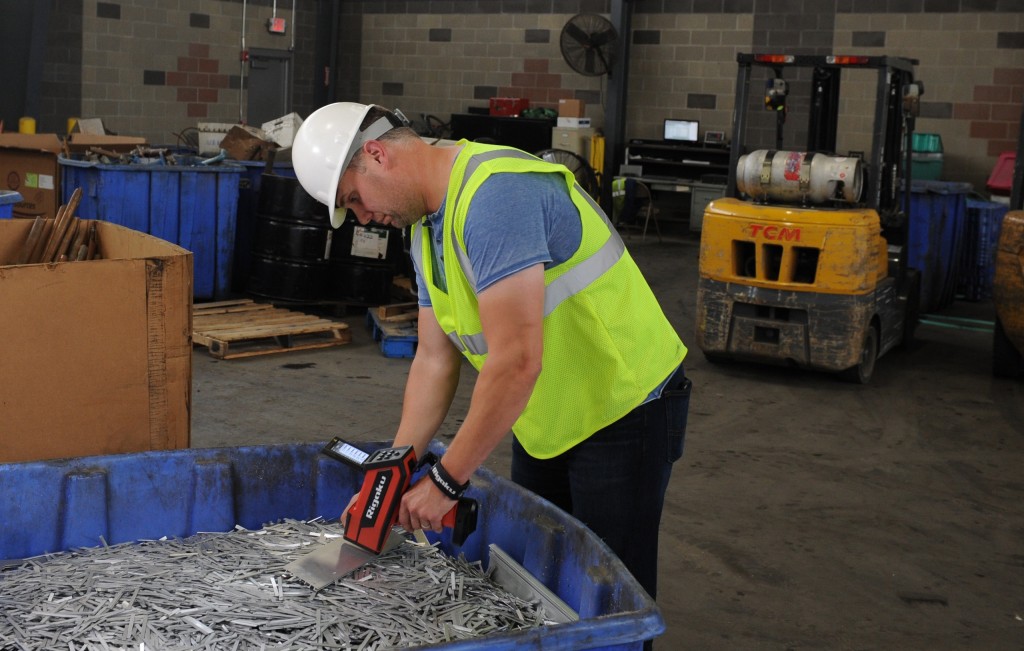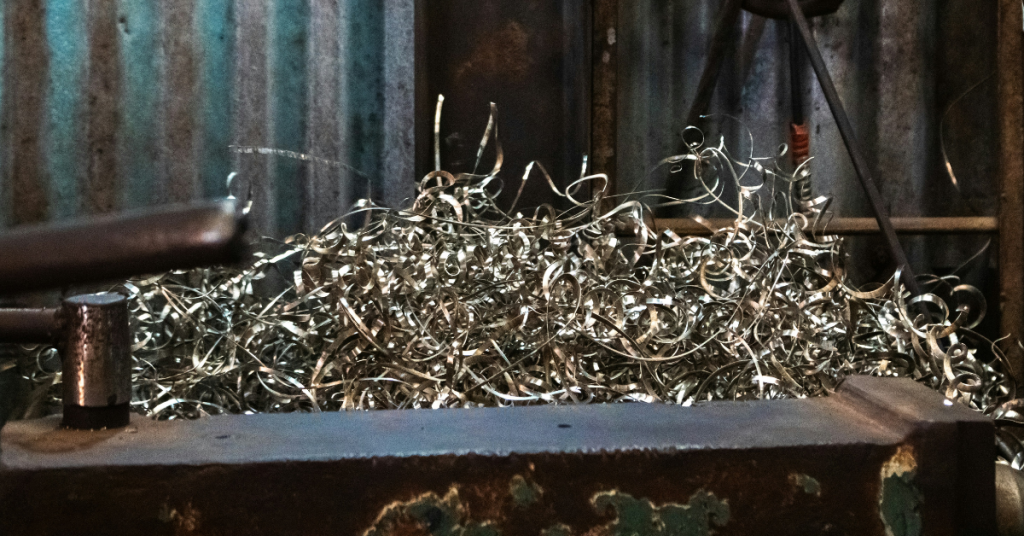Rigaku LIBS handheld analyzers the right tool for Sullivan Scrap
Latest material identification technology meeting the rigorous demands of a modern scrap recycling facility

As any recycler will report, traditional scrap metal sorting techniques are becoming outdated. At the same time, the volume of scrap received from a variety of sources has increased, fueling the demand for better tools to maximize scrap metal identification and profits.
With fluctuating metals prices, precise scrap metal sorting is more important than ever and could mean the difference between reselling materials for cents vs.
dollars. Handheld analyzers are now the instrument of choice in order to meet the rigorous demands of modern scrap recycling, but older generation metal identification instruments can be cumbersome and difficult to use in the typical yard environment. Older models, including some XRF technology, can provide accurate alloy grade separations for fast identification, but in addition to being fragile, technological limitations often result in a failure to rapidly identify all alloying elements - which can mean a missed opportunity for profit.
LIBS technology right for Sullivan Scrap
Founded in 1953, and based in Holyoke, Massachusetts, USA, Sullivan Scrap, part of William Sullivan & Co., has made a business out of taking care of the environment by recycling scrap metal purchased from some of the area's largest manufacturers, down to local individuals in and around New England. They have created a business which focuses on providing customers with the fairest pricing for their scrap, in addition to the most effective, convenient solutions for handling scrap metal challenges. Sullivan Scrap processes about 70,000 tons of material each year, with 25% being non-ferrous. In order to stay competitive, they use different handheld technologies to identify their incoming material in order to process it as efficiently as possible.
Still, Sullivan Scrap recently found itself looking for a way to improve the efficiency of its sorting process by reducing the time and costs associated with metal analysis. The solution was the implementation of a handheld laser induced breakdown spectroscopy (LIBS) analyzer from Rigaku Analytical Devices. The company has now benefited from the ability to analyze a wider range of metals at the point of need and is now able to sell piles of scrap that have been taking up space at a more precise cost - leading to an increase in profit.
THE LIGHT METAL CHALLENGE
According to Sullivan Scrap, they had been using handheld x-ray fluorescence (XRF) for many years, typically for the analysis of nickel alloys, brasses, and other metals made up of heavier elements. However, they found a gap in this technique when it came to processing lighter alloys, such as aluminum.
"Handheld analyzers are the only instruments of choice in order to meet the rigorous demands of modern scrap recycling," said Brian Powell, Vice President, Sullivan Scrap.
Sullivan Scrap discovered LIBS technology about two years ago, and was very pleased with how well the Rigaku KT-100 did for light element analysis - especially with aluminum.
Powell managed the implementation of the handheld LIBS analyzer, described their initial reaction to this new technology.
"We have been very impressed with Rigaku's LIBS capabilities of separating Al 6061 alloys from Al 5052, which can be very difficult to process so quickly," said Powell. "The speed of obtaining those results was something we had not previously experienced and therefore allowed us to sort specific alloys out so we're not making a mixed package."
He says this allowed Sullivan Scrap to upgrade the material they were preparing and thus increase profitability on every pound.
LIBS CAPABILITIES
The Rigaku KT-100 analyzer utilizes the latest technology for materials identification, laser induced breakdown spectroscopy (LIBS). This elemental analytical technique has the ability to detect and quantify elemental composition - both heavy and light elements - in a solid, liquid or gas state.
LIBS is more sensitive and better suited for light element detection - such as aluminum (Al), magnesium (Mg), and beryllium (Be). However, reliable LIBS' analysis of materials with these elements, especially at the point-of-need, has been very limited and typically confined to a laboratory environment - until now.
Recent technological advancements such as miniature, solid state micro-lasers, as well as small, compact spectrometers, have made the design of handheld LIBS
possible and rapidly expanded the use of this versatile technique into filed operations - such as alloy sorting and analysis.
Also, because the KT-100 LIBS analyzer utilizes laser technology, there is no radiation exposure, and minimal to no regulatory restrictions or registration and licensing fees.
VERSATILITY
Sullivan Scrap primarily uses the Rigaku KT-100 LIBS analyzer to sort aluminum alloys, but will use it to sort heavier metals when their handheld XRF is not
available. "We know we can rely on the KT-100 for other alloys and it will do a consistent job just like it does with the aluminum alloys" said Powell.
With the longest battery life of any other handheld metal analyzer of over 6 hours, KT-100 is less susceptible to fatigue and downtime, which is critical for on and off-site operations. Users are able to hold over 4,000 measurements. The analyzer package includes a docking station cradle that will charge the analyzer plus a spare battery at the same time.
"It's very quick and easy and is just right there ready to go whenever you need it," said Powell.
Additionally, WiFi capability allows yard supervisor or managers to view results via wireless network remotely so to make an immediate decision on a material from anywhere in the yard. And its macro camera allows for sample images to be tagged to their associated results on the unit instead of on a mobile device.
SIMPLICITY
With such a large influx of various metals, Sullivan Scrap was in need of a tool that would be easy to introduce to any employee in their yard. With the ability to select what information is available on a results' screen, Powell can determine what he would like his users to see, whether it is the spectra, the chemistry breakdown, or even just the alloy name. He says he will usually have the instrument run in "Alloy Match" mode, so his workers do not need to make any determinations on their own. For more complicated metals, he has the ability to view the chemistry breakdown.
"They can scan all of the aluminum and it will come up with a simple alloy name," said Powell. "We can make it as simple or complex as we want. It's very efficient, very quick, and we can get the material processed and out the door as fast as we can."
Another essential feature is that the keyboard consists of hard, raised buttons. Other handheld analyzers are moving towards a touch screen operation only, and this could be a problem for users who are wearing work gloves for an entire shift.
In addition, the buttons of the KT-100 are assignable. "We can go right from the "Alloy Match" result over to an in-depth alloy analysis that shows the element breakdown, and then back again to the Alloy Match, very quickly," Powell commented.
DURABILITY
The environment at a scrap metal sorting facility is not ideal for analytical technology instruments. Therefore, any tool used to sort metal, needs to be
able to withstand the toughest use.
Another challenge with the use of their handheld XRF was the analysis window
would regularly become jammed when analyzing small pieces, i.e. turnings, and the instrument would need to be returned to the factory for repair. This resulted in down time for the scrap yard, plus has an associated cost.
The KT-100 handheld LIBS analyzer has successfully passed rigorous durability tests proving its capabilities for meeting the needs of those who require a rugged
handheld metal analyzer in the harshest environments.
To guarantee protection against all work environments, KT-100 analyzer underwent strict testing to the United States Military Standard MIL-STD-810G. These tests involved rigorous vibration, shock and drop testing which focused on impact to every angle of the instrument to evaluate its durability and performance when exposed to environmental stress. In addition, its IP-54 rating and safety window composed of fused silica provide protection against dusty and wet environments.



